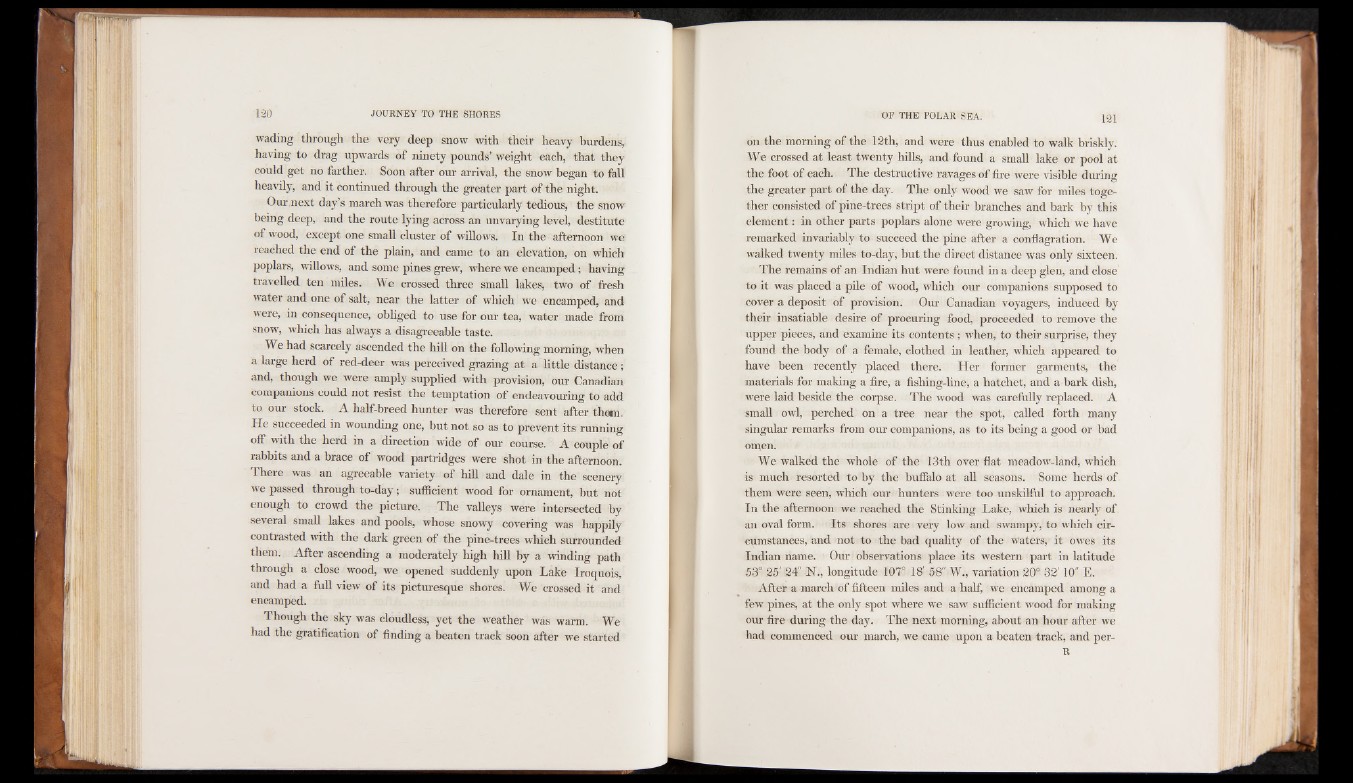
wading through the very deep snow with their heavy burdens,
having to drag upwards of ninety pounds’ weight each, that they
could get no farther. Soon after our arrival, the snow began to fall
heavily, and it continued through the greater part of the night.
Our next day’s march was therefore particularly tedious, the snow
being deep, and the route lying across an unvarying level, destitute
of wood, except one small cluster of willows. In the afternoon we
reached the end of the plain, and came to an elevation, on which
poplars, willows, and some pines grew, where we encamped; having
travelled ten miles. We crossed three small lakes, two of fresh
water and one of salt, near the latter of which we encamped, and
were, in consequence, obliged to use for our tea, water made from
snow, which has always a disagreeable taste.
We had scarcely ascended the hill on the following morning, when
a large herd of red-deer was perceived grazing at a little distance;
and, though we were amply supplied with provision, our Canadian
companions could not resist the temptation of endeavouring to add
to our stock. A half-breed hunter was therefore sent after them.
He succeeded in wounding one, but not so as to prevent its running
off with the herd in a direction wide of our course. A couple of
rabbits and a brace of wood partridges were shot in the afternoon.
There was an agreeable variety of hill and dale in the scenery
we passed through to-day; sufficient wood for ornament, but not
enough to crowd the picture. The valleys were intersected by
several small lakes and pools, whose snowy covering was happily
contrasted with the dark green of the pine-trees which surrounded
them. After ascending a moderately high hill by a winding path
through a close wood, we opened suddenly upon Lake Iroquois,
and had a full view of its picturesque shores. We crossed it and
encamped.
Though the sky was cloudless, yet the weather was warm. We
had the gratification of finding a beaten track soon after we started
on the morning of the 12th, and were thus enabled to walk briskly.
We crossed at least twenty hills, and found a small lake or pool at
the foot of each. The destructive ravages of fire were visible during
the greater part of the day. The only wood we saw for miles together
consisted of pine-trees stript of their branches and bark by this
element: in other parts poplars alone were growing, which we have
remarked invariably to succeed the pine after a conflagration. We
walked twenty miles to-day, but the direct distance was only sixteen.
The remains of an Indian hut were found in a deep glen, and close
to it was placed a pile of wood, which our companions supposed to
cover a deposit of provision. Gur Canadian voyagers, induced by
their insatiable desire of procuring food, proceeded to remove the
upper pieces, and examine its contents ; when, to their surprise, they
found the body of a female, clothed in leather, which appeared to
have been recently placed there. Her former garments, the
materials for making a fire, a fishing-line, a hatchet, and a bark dish,
were laid beside the corpse. The wood was carefully replaced. A
small owl, perched on a tree near the spot, called forth many
singular remarks from our companions, as to its being a good or bad
omen.
We walked the whole of the 13th over flat meadow-land, which
is much resorted to by the buffalo at all seasons. Some herds of
them were seen, which our hunters were too unskilful to approach.
In the afternoon we reached the Stinking Lake, which is nearly of
an oval form. Its shores are very low and swampy, to which circumstances,
and not to the bad quality of the waters, it owes its
Indian name. Our observations place its western part in latitude
53° 25' 24" N., longitude 107° 18' 58" W., variation 20° 32' 10" E.
After a march of fifteen miles and a half, we encamped among a
few pines, at the only spot where we saw sufficient wood for making
our fire during the day. The next morning, about an hour after we
had commenced our march, we came upon a beaten track, and peril